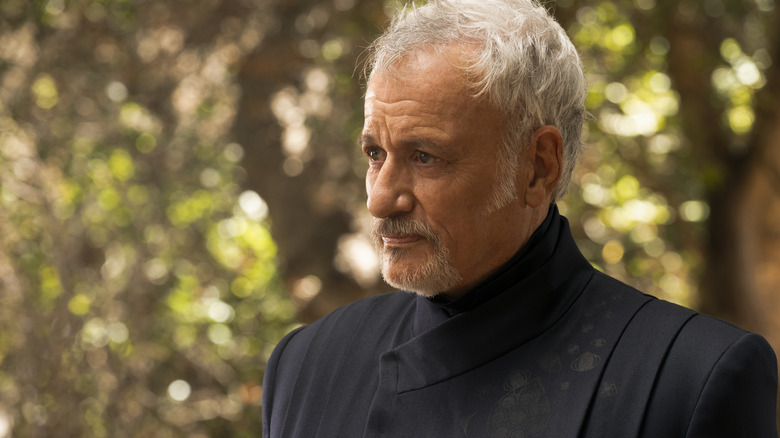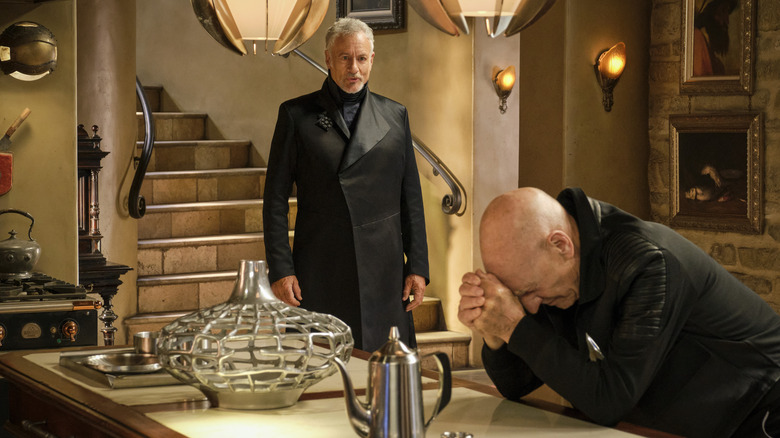John De Lancie Was Left Unhappy By One Controversial Star Trek: Picard Decision
The second season of "Star Trek: Picard" saw the return of Q (John de Lancie) a playful god of mischief that periodically appeared on "Star Trek: The Next Generation" to cause trouble for Captain Picard (Patrick Stewart) and the crew of the U.S.S. Enterprise. Q, being omnipotent and seemingly immortal, didn't think too highly of humans, a primitive corporeal species he saw as being unworthy of space travel. By the end of the series, though, Q found that some humans had the capacity to think in cosmic terms, and he judged us to be finally worthy, if only a little bit.
In "Picard," Q reappeared to announce that the trial never ended, and that he had a fun game to play. He sent Picard into a parallel universe wherein humanity had mastered space travel, but used it to commit galaxy-wide genocide against all other known sentient species. Picard had to travel back in time to the year 2024 to find what went wrong. Q would later reveal that his little time travel game was a dying wish. It was all a way of playing with one of the only humans he felt any fondness for before his godlike existence suddenly came to an end. Naturally, since time has no meaning for Q, he would return.
It had previously been established that members of the Q Continuum can indeed die in the "Star Trek: Voyager" episode "Death Wish" (February 19, 1996) wherein a second Q (Gerrit Graham) petitioned Captain Janeway (Kate Mulgrew) for his right to be euthanized. So, when Q died, Trekkies couldn't call foul. Regardless, de Lancie felt that Q's death on "Picard" wasn't handled very well. Mostly because "Star Trek," at least when it's operating at peak efficiency, tactfully deals with the heady, philosophical issues attached to life and death. In a 2023 interview with ScreenRant, de Lancie revealed his disappointment and what he feels could have been done to improve the season.
The nature of Q's mortality
Throughout "Star Trek," it's been constantly said that Q lives outside of normal space/time. He claims to be impossibly ancient, and that his species doesn't die. The fact that he died in "Picard" did contradict all that, but most Trekkies would say that the series played fair. But if Q was going to die, de Lancie felt that blocks of dialogue should have been devoted to explaining that. Did he run out of power? Does the Q Continuum cull its numbers every few eons just to keep their population in check? Nothing is explained. All we know is that Q is losing his powers because he's at death's door. One might intuit that he's dying of old age, but the show never bothers to elucidate. As De Lanice put it:
"Well, I wasn't happy about the dying part because I just kept saying, 'You know, this is 'Star Trek.” 'Star Trek' deals with big issues. If you're going to have me die, which is fine, we need to delve into that. And quite frankly, death is perhaps the biggest human issue that there is. And we need to delve into it. And they didn't delve into it. And so I thought of it as being somewhat of a lost opportunity."
De Lancie even expressed his concern to showrunner Terry Matalas, knowing that Trekkies — notoriously sticklers for detail — wouldn't be able to accept Q's death without a few words of cosmic technobabble to make it seem realistic. He continued:
"I made myself clear to Terry. I just said, 'I don't know, it just doesn't rest well with me.' [...] I feel that the audience will come and say, 'I don't understand. You're immortal. There's a disconnect here. What's going on?' We need to answer some of these questions."
It could have been as simple as "Your human mind cannot understand paradoxes, how something can be eternal and finite at the same time." It was fine to make it ineffable, but there had to at least be an explanation.
Q's return
The second season of "Picard" was full of other strange conceits besides, and included references that were oblique, even to deep-cut Trekkies. (Gary Seven anyone?) Also Q, despite being a deity, has to do silly things like disguise himself as modern day FBI agents and slip people business cards as instructions. His powers may have been fading, but this seems very out-of-character for Q.
Luckily, as mentioned above, Q would return. The third season of "Picard" ended with Picard's adult son Jack (Ed Speleers) taking a position on the newly rechristened Enterprise-G. The idea was that "Picard" would lead directly into a new series called "Star Trek: Legacy," although the likelihood of that series is rapidly withering. But I digress. In an epilogue, Jack was settling into his quarters when Q appeared out of thin air. Jack recognized Q right away and asked how he could be here if he already died. Q admonished Jack for thinking in such linear terms.
De Lanice appreciated the return. Not only did he get another job, but Q's reappearance erased some of the unexplored mysteries of his death from the previous season. He continued:
"I love the fact that [Q's cameo] was done during the crawl. And I love the fact that it's a wonderful episode. It really wrapped up 'TNG,' and it really was terrific. And I could just imagine people at home going, 'Oh, wow, that's great.' You know, and they're talking, and one person in the room is sort of watching the crawl, and then all of a sudden goes, 'Ohhhhh!'"
"Star Trek" is currently in a state of contraction, with fewer new shows being put into production than in 2017 when "Discovery" debuted. We may or may not see more Q. Only time will tell, linear or not.


